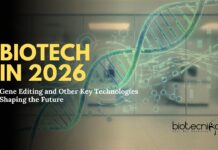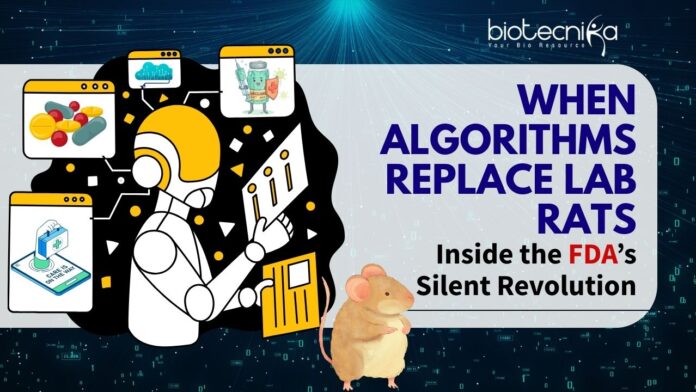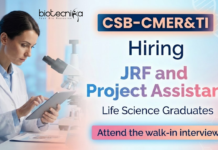When Algorithms Replace Lab Rats: Inside the FDA’s Silent Revolution
For decades, the path from discovery to a lifesaving drug has been heavily dependent on animal testing, prohibitively expensive, as well as slow in process. Patients often wait for years while drugs and treatments progress through this complex Drug Approval pipeline. Now, Artificial Intelligence in Drug Discovery is emerging as a powerful catalyst, promising to reduce dependence on animal studies, lower expenditures, and shorten timelines. With the FDA (Food and Drug Administration) championing this shift and laying out the strategic roadmap to make animal testing the exception within the next 3-5 years, the Pharmaceutical industry is on the brink of a more patient-centered, efficient, and humane era.
Artificial Intelligence in Drug Discovery is more than an experimental tool; it is becoming a central driver of Pharmaceutical innovation. Drug Discovery professionals are increasingly adopting AI-powered platforms to speed discovery, reduce costs, and optimize safety testing. This shift would reduce dependence on animal testing, envisioning new standards for Preclinical Research in the coming years.
The High Cost of Traditional Drug Development
Launching a new drug in the market has long been one of Science’s most expensive and time-consuming challenges. The process can take up to 15 years and cost nearly $2 billion, with a significant portion of the expense tied to Preclinical animal testing.
Now, experts say this model is changing. According to 11 specialists from Research companies, Biotechnology companies, and brokerages, AI-driven methods could reduce timelines and costs by at least 50% within 3-5 years, thereby transforming the pace of development.
Pioneers in AI-Based Discovery
Several companies are already leading the shift toward Artificial Intelligence in Drug Discovery, showcasing how these tools are reshaping early-stage Research:
- Certara (CERT.O) utilizes AI to simulate the distribution, metabolism, and absorption of drugs, as well as to predict potential toxic side effects, thereby reducing the early reliance on animal studies.
- Schrodinger (SDGR.O) applies Computational Chemistry to model Molecular interactions and efficiently prioritize drug candidates.
- Recursion Pharmaceuticals (RXRX.O) advanced a Cancer drug candidate into Clinical testing in just 18 months, compared with the industry average of 42 months.
The president of drug development solutions at Certara, Patrick Smith, emphasised, “We are getting to the point where we don’t actually need to do that (animal testing) anymore,” stating work on Monoclonal Antibody therapies for infectious diseases such as Hepatitis B.
Speed and Cost Benefits
The economic impact is hard to ignore. Analysts at TD Cowen and Jefferies estimate AI could more than halve both development expenses and timelines. By enabling earlier identification of viable compounds, companies can avoid costly late-stage Drug failures.
Recursion’s rapid progress illustrates this potential. By reducing early development time from 42 months to 18 months, it demonstrated how AI can accelerate Drug pipelines without compromising rigor. Such efficiencies could also empower smaller biotechnologies to compete with larger Pharmaceutical companies, broadening innovation across the sector.
FDA’s Roadmap for Reduced Animal Testing
The FDA is not only acknowledging these advances but actively supporting them. In April, the agency issued a roadmap for reducing reliance on animal studies, particularly in Preclinical safety testing for Monoclonal Antibody drugs.
Its goal is ambitious: within three to five years, animal testing should be the exception rather than the rule. The agency envisions AI-driven models, human cell-based systems, and computational simulations as the new standards.
This innovative approach aims to reduce development costs as well as enhance predictive accuracy for human outcomes. Ultimately, the FDA expects that such efficiency, driven in part by Artificial Intelligence in Drug Discovery, will contribute to lower drug prices and better patient access.
Scientific & Ethical Balance
The experts caution the Scientific community against expecting the complete elimination of animal testing in the near future for Research and Clinical Trials. Complex Biological processes, particularly those involving the immune system or novel mechanisms, cannot yet be fully replicated through AI or cell models.
A Life Sciences and Biotechnology analyst at TD Cowen, Brendan Smith, stated, “I don’t think we’ll get to a point immediately, in the near term where all of a sudden, animal testing is gone entirely,” This highlights that although AI can significantly reduce dependence on animal testings, limited animal testing will still be needed for complex validations in the future.
However, AI is expected to minimize dependence on animals, reserving them only for Research situations where alternatives cannot provide sufficient validation. This represents a significant scientific and Ethical step forward, aligning innovation with humane practices in the Pharmaceutical and Healthcare sectors.
Implications for Patients
For the Healthcare sector and patients, the benefits could be quite revolutionary. Shorter timelines mean faster access to new therapies, especially in infectious diseases, rare disorders, as well as Oncology. Lower costs may also ease one of the industry’s biggest challenges: the high price of innovative Medications and Therapeutics.
If expert forecasts prove correct, drugs that once took more than a decade to reach patients could be available in half the time, and at more affordable prices.
Industry at a Turning Point
The integration of AI into Drug Discovery is already underway. Companies such as Schrödinger, Recursion, and Certara are demonstrating that Computational models can match. This could sometimes outperform the conventional methods. The FDA’s evolving stance gives firms confidence to invest in these tools on a larger scale.
Oversight will remain essential, ensuring transparency in close collaboration between Regulators and Researchers. AI methods, combined with rigorous validation, will be crucial in maintaining patient safety.
Looking Ahead: AI Drug Discovery, FDA Revolution
In the coming years, this advancement and revolution could prove decisive for the future of Drug Development. If AI adoption continues at its current pace and aligns with the FDA’s Drug roadmap, the Pharmaceutical and Healthcare industry could witness one of the most significant transformations.
Drug Discovery that is cheaper, less reliant on animals, as well as faster would not only benefit Pharmaceutical companies but also transform the outcomes for patients globally. From lowering barriers to innovation to making treatments more accessible and affordable, the potential impact is enormous.
While animal studies may not disappear overnight, the trajectory is quite clear: AI is no longer just an advanced tool in the laboratory, but is becoming the cornerstone of a new era in the Drug Discovery, Pharmaceutical, and Healthcare sectors.


























